Brahms Requiem
$15.00
The masterpiece Requiem of the Romantic era in a rare English version!
Description
Exultate’s full-orchestral recording of The German Requiem by Johannes Brahms is one of only two known recordings sung in English available on CD today. This performance includes a festival Chorus and Orchestra of over 120 musicians and soloists Anna Haagenson (soprano) and William Strom (baritone).
Click titles for sound samples:
01 – Blessed are They That Mourn
02 – Behold, All Flesh is as the Grass
03 – Lord, Make Me to Know
04 – How Lovely is Thy Dwelling Place
05 – Ye Now are Sorrowful
06 – Here On Earth Have We No Continuing Place
07 – Blessed are the Dead
Thoughts from conductor, Thomas D. Rossin, on A German Requiem (Opus 45) by Johannes Brahms:
The work presented on this recording is the most extensive work of Johannes Brahms, his monument of choral expression,A German Requiem. The composition, Opus 45, was begun in the 1850¹s with sketches of themes for the D minor Symphony which was never completed. Various theories have been advanced about the immediate reason for writing the Requiem when he did, but there is no definitive personal event which one can point to as the catalyst for the inspiration. However, there seems to be a consensus that Brahms was influenced to some extent by the death of his mother, Christine, and his close friend, Robert Schumann. He may have acquired the idea for A German Requiem from Schumann’s diary. Some years before he died, Schumann had written about an idea for a German Requiemwith a text which was not the traditional Roman Catholic funeral sequence, but one with words of comfort drawn directly from Scripture.
By 1861, Brahms had completed four movements in the form of a funeral cantata, but it was not until 1868 that all seven movements were completed. The first performance was given in February of 1869 in Leipzig.
In choral music, it is not always true that the key to comprehension can be found in the value of the text which has been set. Music often transcends the boundaries of the words and gives even a higher quality and meaning not able to be grasped in the text. This, however, is definitely not the case in Brahms’ A German Requiem. Here, the more complete and mature understanding of the work lies in the Word. It is a very careful and sensitive borrowing from Scripture of passages dealing with the subject of the frailty of humans. Brahms departs dramatically from the traditional Latin Requiem text in that he avoids the cataloging of the horrors of Judgment Day and the wrath of God which will surely envelop the unbeliever. Instead, he dwells not on the dead, but on the living in a series of beautifully woven passages concerned with comfort, faith, consolation, joy, heavenly bliss, victory over death, and finally – eternal peace. To be sure, the earthly suffering and nothingness of humans are portrayed along with the ugliness of death and the grave, but Brahms¹ own choice of text transforms this despair into glorious victory. It is a path of hope, promise, and comfort for the living, a preparation for one’s own death.
The climax arrives in movement six wheredeath is swallowed up in victory. With the text,Death, oh where is thy sting, the composer masterfullylaughsat death by using a marvelous waltz rhythm and then uses the key of C major (and the absence of any accidentals or blacknotes) toerasethe sting of death completely. Even trumpets in theRequiem, traditionally reserved for theDies irae, are used here for a signal of majestic victory and joy in the resurrection. So sure is the order and structure of the text, that when Brahms finally arrives at the wordsblessed are the dead which die in the Lordin the last movement, it is as if a complete circle of comfort and confidence has enveloped the listener, as if outstretched arms have enfolded all within reach. Even the musical material is closely related to the first movement.
Johannes Brahms, sometimes called the father of musicology, was certainly cognizant of the architectural designs of the works of Johann Sebastian Bach and other composers of the past. This fact is nowhere clearer than in the overall structure of theRequiem. Even the keys fit very well into a logical order. Notice that movement four is the only movement which speaks of the joy and bliss of heaven and that Brahms chooses the most remote key to portray these thoughts most faraway. This structure is obviously not intended directly for the listener, but by understanding the depth of planning and seriousness with which Brahms composed this work, one can more completely appreciate the importance he must have placed on the outpouring of his own inner faith, and in turn gain a greater measure of understanding into his most awesome manner of expressing his faith through his artistic gift.
A German Requiem is truly a masterful gift to all of us who are privileged to experience it.
Soloists:
Anna Haagenson, soprano, holds the Bachelor of Music degree from the University of Colorado at Boulder and the Master of Music degree in vocal performance from the University of Minnesota. She has studied at the HageGården Music Center in Sweden with Håkan Hagegård and has received vocal coaching from Martin Issep, Lucy Shelton and Thomas Houser. She is a voice teacher who appears frequently in Minnesota Opera productions, was soprano section leader in the Minnesota Chorale and has sung solos with the Minnesota Orchestra. Symphonic solo work has included Falstaff by Verdi, Mendelssohn’s Elijah, Mozart’s Requiem and Grand Mass in C Minor, Poulenc’s Gloria, the Bach St. Matthew Passion, Handel’sMessiah and Bloch’s Sacred Service. She has received performance awards from the Schubert Club and was named the national winner of the Mother of the Year Vocal Competition.
William Strom, baritone, graduated from Augsburg College with a Bachelor of Arts degree in Philosophy and holds a Master of Divinity degree from Luther Seminary. A Lutheran Pastor, he has also enjoyed a distinguished career in vocal performance. He has sung as a soloist with the St. Paul Chamber Orchestra, the Oudal Chorale, the Dale Warland Singers, the Minneapolis Symphony, the Mankato Symphony, the Rochester Symphony, the Augsburg Centennial Singers, and Exultate. He has sung solos in La Traviata, Amahl and the Night Visitors, the Brahms Requiem, Handel’s Messiah, The Seven Last Words of Christ by Théodore Dubois, the Haydn Creation, Mendelssohn’s Elijah and St. Paul, and the Mozart Requiem. In addition, he has received several Schubert Club competitive performance awards and appears on Exultate recordings.
You must be logged in to post a review.
This site uses Akismet to reduce spam. Learn how your comment data is processed.

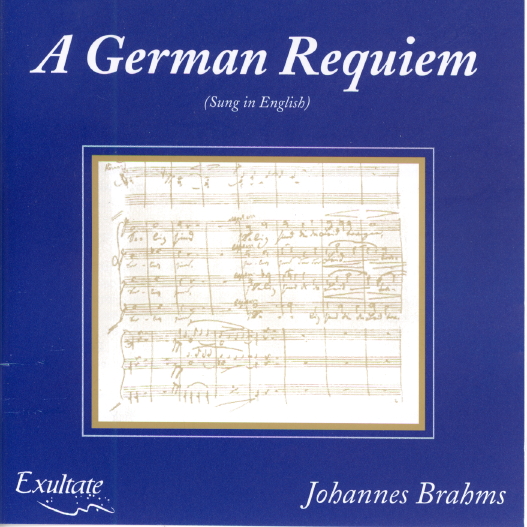
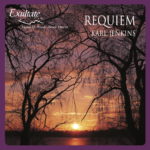
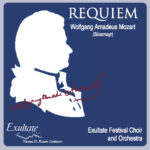
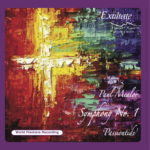
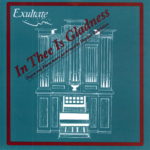
Reviews
There are no reviews yet.